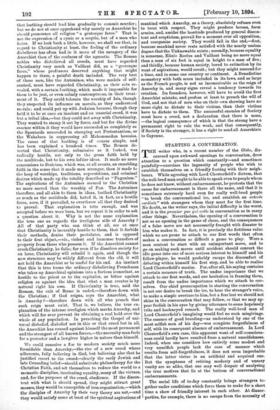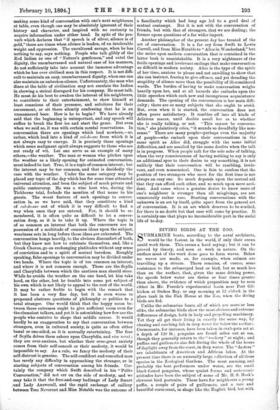STARTING A CONVERSATION.
THE writer who, in a recent number of the Globe, dis- coursed upon awkward openings to conversation, drew attention to a question which constantly—and sometimes painfully—exercises the ingenuity of people who wish to establish themselves on a friendly footing with their neigh- bours. While agreeing with Lord Chesterfield's dictum, that the well-bred man ought to be able to speak even to people whom he does not know, without embarrassment, he protests that the cause for embarrassment is there all the same, and that it is sometimes extremely hard even for really well-bred people "to break the conversational ice, and establish an entente corcliale" with strangers whom they meet for the first time. No doubt, as the writer says, the initial difficulty is the worst, and it is the premier pas qui coite in conversation as in many other things. Nevertheless, the opening of a conversation is not as an opening in the game of chess, and the consequences of a false move are not necessarily fraught with disaster to him who makes it. In fact, it is precisely the fictitious value which we are prone to attach to our first words that often makes a conversation so difficult a game to play. Were a man content to start with an unimportant move, and to go on making such moves until accident should convert the idle game into one of more serious interest to himself and his fellow-player, he would probably escape the discomfort of debating within himself his first step, and be able to realise Lord Chesterfield's maxim. For, after all, his saying contains a certain measure of truth. The undue importance that we attach to our first words, and our hesitation in framing them, result from the undue importance which we attach to our- selves. Our chief preoccupation in starting the conversation is not our desire to break the ice, to hear the stranger's voice, to make a simple overture to him, but a fear lest we should not shine in the conversation that may follow, or that we may ap- pear foolish in his eyes by giving utterance to some hopelessly trite and hackneyed remark. The really well-bred man of Lord Chesterfield's imagining would feel no such misgivings. The essence of good breeding—as understood by one of the most selfish men of his day—was complete forgetfulness of self, with its consequent absence of embarrassment. In Lord Chesterfield's own case, this apparent want of self-conscious- ness could hardly have resulted from a natural unselfishness. Indeed, when one considers how entirely some modest and very unselfish people lack the ease of manner which results from self-forgetfulness, it does not seem improbable that the latter virtue is an artificial and acquired one. But the symptoms of retiring modesty and of uneasy vanity are so alike, that one may well despair of analysing the true motives that lie at the bottom of conversational embarrassments.
The social life of to-day constantly brings strangers to- gether under conditions which force them to make for a short time a show of friendly interest in each other. At dinner- parties, for example, there is no escape from the.necessity of making some kind of conversation with one's next neighbours at table, even though one may be absolutely ignorant of their history and character, and inspired with no curiosity to acquire information under either head. In spite of the pro- verb which declares that "if speech is of silver, silence is of gold," there are times when silence is leaden, of an intolerable weight and oppression. The uncultured savage, when he has nothing to say, says nothing. People who talk glibly of the Red Indian as one of "Nature's gentlemen," and extol the dignity, the unembarrassed and natural ease of his manners, do not sufficiently take into account the immense advantage which he has over civilised man in this respect. It is not diffi- cult to maintain an easy, unembarrassed dignity, when one can also maintain an unbroken silence. Unfortunately, the man who dines at the table of civilisation may not emulate the Indian in showing a stoical disregard for his company. He must talk. He must do his best to awaken the interest of his neighbours, to contribute to their entertainment, to show himself at least conscious of their presence, and solicitous for their amusement., or sit there silently confessing that he is an unmannered boor. How is he to begin ? We have already said that the beginning is unimportant, and any speech will suffice to break the first ice and start the game. But even when we said so, it was with certain mental reservations. In conversation there are openings which lead nowhere,—or, rather, which lead into a kind of cul-de-sac from which it is not always easy to emerge. It is precisely these openings which some malignant spirit always suggests to those who are not ready of wit. Let one serve as an example of many others,—the weather. The man or woman who pitches upon the weather as a likely opening for animated conversation, must indeed be lost. True, it is a topic of common interest; but the interest may be too common, and that is decidedly the case with the weather. Under the same category may be placed any topic of the day which has for some time attracted universal attention, and been the subject of much private and public controversy. He was a wise host who, during the Tichborne trial, forbade the mention of that name to his guests. The worst feature of such openings to conver- sation is, as we have said, that they constitute a kind of cul-de-sac out of which it is very difficult to find a way when once they are entered. For, it should be re- membered, it is often quite as difficult to let a conver- sation drop, as it is to take it up. Where the topic is of so common an interest that both the conversers are in possession of a multitude of common ideas upon the subject, weariness sets in long before those ideas are exhausted. The conversation hangs heavily, to the obvious discomfort of both, but they know not how to extricate themselves, and, like a Greek Chorus, go on exchanging platitudes without any sense of conviction and in a spirit of mutual boredom. Roughly speaking, false openings to conversation may be divided under two heads. Where the topic is of too common an interest, and where it is not common enough. These are the Scylla and Charybdis between which the cautious man should steer. While he avoids the weather on the one hand, let him take heed, on the other, lest he tumble into some pet subject of his own which is not likely to appeal to the rest of the world. It may be rather feeble to begin with the remark that it has been a very fine day, but it is even worse to propound abstruse questions of philosophy or politics to a total stranger. One would think that the happy mean be- tween these extremes ought to give sufficient room even for -the clumsiest talkers, and yet it is astonishing how few are the people who contrive to shape that middle course. It would hardly be an exaggeration to say that conversation between strangers, even in cultured society, is quite as often either banal or one-sided, as it is mutually entertaining. The fear of Scylla drives them ashore upon Charybdis, and vice verde; they are over-anxious, but whether their over-great anxiety comes from their self-conceit or their modesty, it would be impossible to say. As a rule, we fancy the modesty of their self-distrust is genuine. The self-confident and conceited man has rarely any difficulty in approaching the stranger, or in starting subjects of conversation among his friends. Cer- tainly the company which Swift described in his "Polite Conversation," did not err on the side of modesty, and we may take it that the free-and-easy badinage of Lady Smart and Lady Answerall, and the rapid exchange of raillery between Tom Neverout and Miss Notable was the outcome of a familiarity which had long ago led to a good deal of mutual contempt. But it is not with the conversation of friends, but with that of strangers, th4 we are dealing; the former opens questions of a far wider import.
Another philosopher of the present day has treated of the art of conversation. It is a far cry from Swift to Lewis Carroll, and from Miss Notable to "Alice in Wonderland," but. the satire upon modern conversation that is contained in the latter book is unmistakable. It is a very nightmare of the futile openings and irrelevant endings that make conversation so difficult in modern society. Alice is the type of the spirit of her time, anxious to please and not unwilling to show that she can instruct, fearing to give offence, and yet dreading the stupidity of silence more than the possibility of ill-considered words. The burden of having to make conversation weighs heavily upon her, and at all hazards she embarks upon the little speeches which each new and incongruous acquaintance demands. The opening of the conversation is her main diffi- culty; there are so many subjects that she ought to avoid. But, even when it is started, the conversation does not often prove satisfactory. It rambles off into all kinds of delirious mazes, until doubts assail her as to whether she is really talking, or not. "This cannot be conversa- tion," she plaintively cries, "it sounds so dreadfully like non- sense." There are many people—perhaps even the majority of people—who embark upon their conversations in the same spirit as Alice did, struggle with the same initial difficulties, and are assailed by the same doubts when the talk is in progress. When people talk for the sole sake of talking, when the very consciousness of having nothing to say is only an additional spar to their desire to say something, it is not unlikely that their conversation will be rambling, irrele- vant, and even nonsensical. One is fain to confess that the position of two strangers who meet for the first time is not always an easy one. So much depends upon the mutual aid that they can afford each other, and so much upon mere acci- dent. And cases where a genuine desire to know more of one's neighbour is stronger than all misgivings, are not unnaturally rather rare. Starting conversations with the unknown is an art by itself, quite apart from the general art of conversation. It is an art which deserves to be studied, for there is no doubt but that ease will come by practice. It is certainly one that plays no inconsiderable part in the social life of to-day.







































 Previous page
Previous page